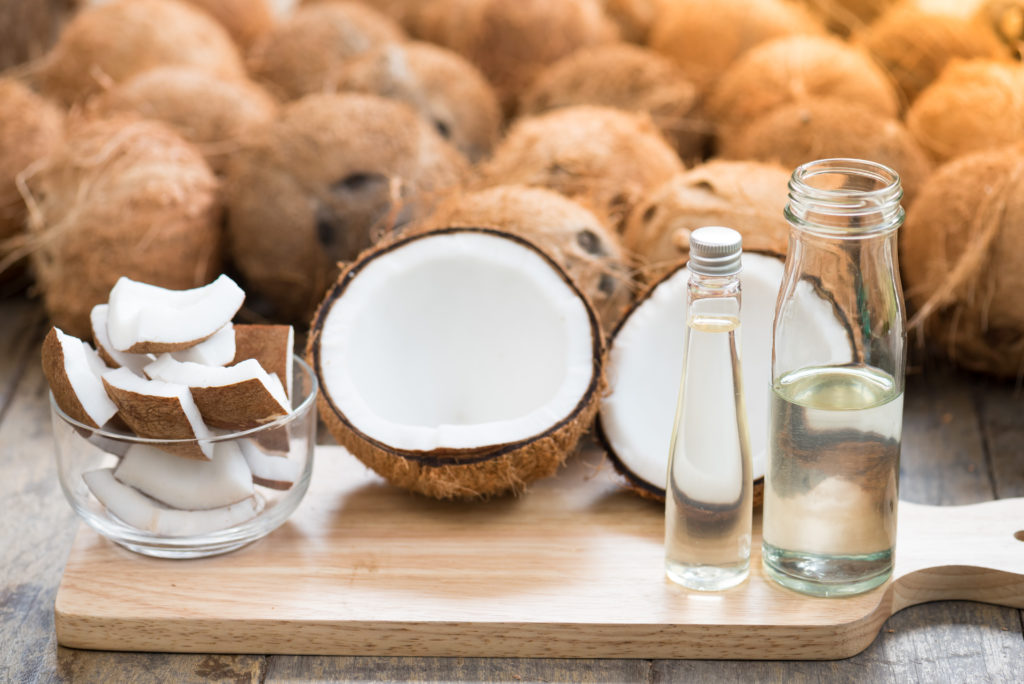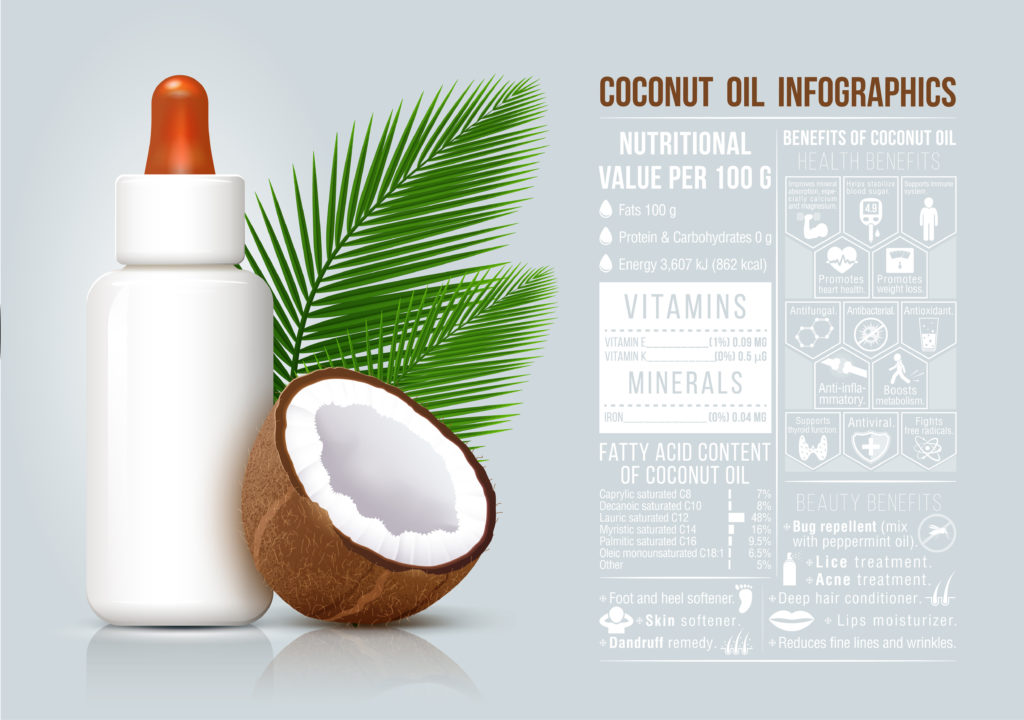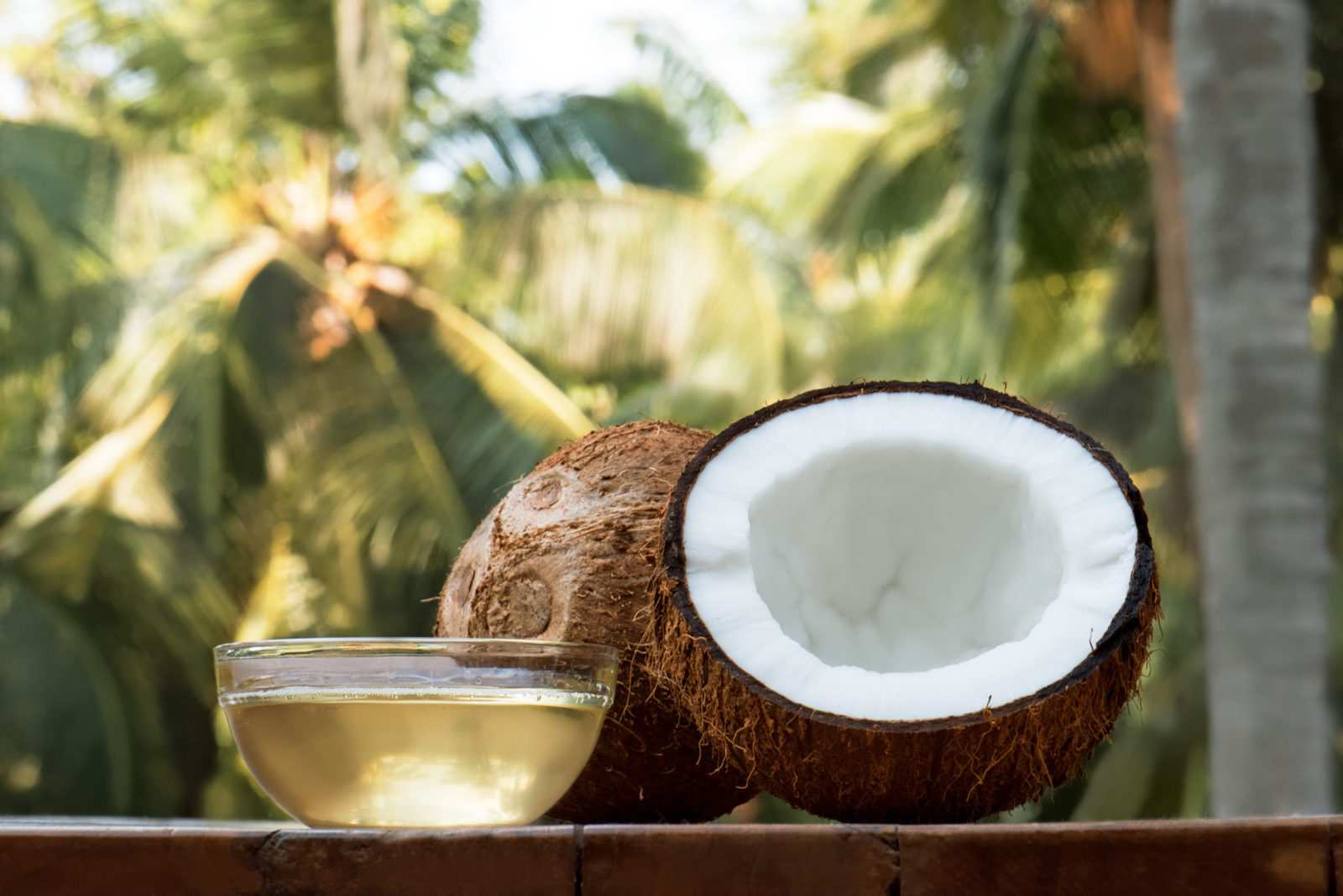Coconuts have been used by people of the tropics for hundreds of years, initially being prized for its water content, and later in history for its flesh and ability to produce oil. Coconut oil has been part of the diet of communities in the Philipines, Indonesia, Brazil, Thailand, Polynesia, India, and the Caribbean for many years and today wild coconut grows in about 80 countries worldwide. During the 1800s fish and chips shops in Britain would use coconut oil, named “nut lard”, when animal fat was unavailable as it was abundant in the colonies.
What is Coconut Oil?
Coconut oil is derived from the flesh or meat of the coconut (Cocos nucifera) also known as the kernel. Coconut ripens on the palm and required one year to mature. Traditionally coconut oil would be fermented, made at home by allowing coconut milk to ferment and the oil to separate from the coconut water. The oil would then be collected and heated to allow any excess coconut water to evaporate. There are a variety of methods that are used to extract the oil out of the coconut, some resulting in unrefined or refined coconut oil.
Extra Virgin Coconut Oil
Pressed raw coconut meat resulting in an unrefined oil, which is also the most nutrient-dense and beneficial. It does use a bit of heat (up to 120 degrees C) but does not harm the oil and studies have found it to result in a higher quality oil. Not treated with chemicals, it has a pleasant coconut smell and taste (This is a great way to know you have unrefined coconut oil. If it is lacking in taste and smell you have refined and chemically treated coconut oil on your hands). It is a high source of antioxidants.
However, unlike Extra Virgin Olive Oil (that still gets mislabeled 80% of the time) there are no fixed guidelines for production or distribution or coconut oil, therefore it is important to inform yourself on the suppliers and select an Extra virgin or unrefined virgin coconut oil.
Regular Coconut Oil
Treated so that it does not smell or taste of coconut with the use of bleach and is deodorized as well as having sodium hydroxide added to it. It is also often hydrogenated, therefore it now contains trans-fats. Unlike unrefined coconut oil, refined coconut oil often uses too much heat that can denature the oil.
MCT Oil – Medium Chain Triglyceride Oil
Although medium-chain fatty acids are found within coconut oil, you can also purchase pure MCT oil. MCTs are easy to digested and processed by the liver into energy known as ketones, which provides the brain with energy much like glucose. It does not get solid below 76% and does not contain the same benefits as unrefined coconut oil, however for individuals looking to lose weight it is a great addition to your diet, particularly useful to add to smoothies and soups.

Benefits of Coconut Oil
Coconut oil is high in healthy saturated fats (which boost fat burning and provide the body with a quick easy to use energy), full of medium-chain triglycerides all of which provide the body with many health benefits.
Increases Metabolism & Encourages Weight Loss
Virgin coconut oil contains medium-chain fatty acids (MCFA), also known as medium-chain triglycerides (MCT). These MCFA’S are more easily digested by the body than other kinds of fat, making them easily processed by the liver and converted into a rapid source of energy. Hence, it leads to an increase in the metabolic rate of the body, increases chances for weight loss along with greater energy output. It has been shown that people having a diet of medium-chain fatty acids have lost more weight than those on a diet of olive oil. 15-30 g of MCT oil a day can increase your energy expenditure by 5% for 24hours aiding in burning an extra 120 calories per day, as well as leaving you to feel more satiated so that you feel fuller without having to eat more or binge eat.
Heart Health and Coconut Oil
The saturated fats present in coconut oil aid in increasing HDL cholesterol levels in the body and does not lead to an increase in coronary heart disease. In 1997 a study in Kerala, South India found that the popular consumption of coconut oil (which has been used in India for hundreds of years) did not have a connection to the rising incidents of coronary heart disease.
Consumption of saturated fat does not result in mortality, coronary heart disease, stroke or type 2 diabetes. If one has coronary heart disease, reducing the consumption of saturated fats does not result in any benefits, however, the consumption of saturated fats has been shown to reduce the progression of atherosclerosis, whereas the consumption of carbohydrates and polyunsaturated fats increases the rate at which atherosclerosis develops.
Boosting Brain Health
Patients with Alzheimer’s have decreased the ability to create insulin, which is especially required to turn glucose into a viable energy source to get the gears in the brain turning. Consumption of healthy fats, such as coconut oil provides ketones, a fat source of energy for the brain to use instead of glucose and which does not rely on insulin, making it beneficial for patients with Alzheimer’s. Older individuals who are having trouble with memory recall can also find benefit in increasing coconut oil or MCT oil consumption in their diet. Because coconut oil is easy to digest it will provide them with a quick source of energy to power their brain.
Candida Infections and Coconut Oil
Caprylic acid is one of the most potent antifungals against candida overgrowth. The wonderful thing about coconut oil, as long as you do not have an allergy to it, is that it is safe to be used internally and externally. Consuming it orally on a daily basis, aids in diminishing the amount of yeast overgrowth in the digestive system
Coconut oil is an amazing candida killer. In a 2016 study on fungal growth in children, coconut oil was shown to be as effective as ketoconazole at the elimination of candida overgrowth (Shino, B, et al., 2016).
Coconut Oil for Vaginal Yeast Infection
Caprylic acid is found naturally in coconut oil. This medium-chain fatty acid possesses natural antifungal and anti-yeast properties that can be used to aid in the treatment of a yeast infection. Its short carbon chain allows the caprylic acid to base the wall of fungus or yeast, destroying the cell membrane and causing the fungus or yeast to separate (Kharrazian, D., 2013). Applying coconut internally during a yeast infection, or even using it as a lubricant occasionally can greatly improve the health of the vagina. When experiencing a vaginal yeast infection, applying coconut oil locally can also aid in soothe and reducing inflammation, which will aid in diminishing the pain and itching associated with the infection (Fife, B., 2013).
Gum Disease and Tooth Decay
Oil pulling using coconut oil aids in cleansing the mouth of bad bacteria which can cause tooth decay, gum infections, and bad breath. Removing bad bacteria from the mouth aids in reducing the occurrence of periodontal disease. To learn more read our article on oil pulling.
Coconut Oil for Skin Health
Coconut oil is wonderful as a facial cleanser, makeup remover, and a skin moisturizer. Fatty acids, caprylic and lauric acid, present in coconut oil aid in reducing inflammation and redness of the skin, both internally and externally.
Coconut oil is the best way to get out of rough and acne-prone skin. It has two important acids called, lauric acid and capric acid. These acids covert the infective acids present on the skin into monolaurin and monocaprin, therefore protecting the skin from infections.
Coconut oil contains another important component, vitamin E. This vitamin also regulates the production of sebum and also unclogs the pores of the skin for preventing acne and pimple breakouts as well as nourishing the skin, reducing the dryness associated with eczema and psoriasis or simply dry skin. Coconut oil has been shown to reduce inflammation and redness.
Coconut oil is effective for eczema it aids in reducing its severity and does a better job than petroleum jelly or mineral oil. As for individuals with eczema, coconut oil will aid in addressing dry skin by providing it with nutrients to keep it moisturized and healthy. When applied to the skin of newborn children over several weeks, it has been shown to reduce the risk of infection, this is particularly beneficial for premature infants who have immature skin.
Coconut Oil For Cracked Heels
Coconut oil is good for reducing the dryness in the skin and treating the roughness and hard texture of it. Because of its anti-microbial, anti-fungal and anti-bacterial properties and the moisturizing effect it also prevents the skin from many conditions like eczema, dermatitis, etc.
Apply a thin layer of coconut oil after washing and drying the feet aids in softening cracked heels and feet.
Coconut Oil for Hair Health
Coconut oil has proved to be very beneficial for chapped lips, dry skin and as a good natural hair conditioner. Coconut oil aids in preventing protein loss in hair. Using this regularly will help you get smooth and silky hair, coconut oil will also improve hair strength, health, luster, and thickness as well.
Coconut Oil for Dandruff
The anti-fungal and anti-bacterial properties of coconut oil are very beneficial in curing the condition caused by a fungal infection. It is also useful in case it is a result of psoriasis or any other bacterial infection. It also treats the dryness and lemon juice refreshes the hair and aids the function of coconut oil further.
Take coconut oil and lemon juice in an equal ratio and mix well. With fingertips gently massage the solution for a few minutes and then cover it with a shower cap. Let it be for 30 minutes and then wash it off with water.

Nutrients in Coconut Oil
Coconut oil is 91% saturated fat.
Chief fatty Acid Chains in Coconut Oil include, lauric 45%, myristic acid 18%, palmitic 9% oleic 8%, caprylic 7%, capric 7% and stearic 5%.
Coconut oil also contains a small amount of vitamin E or tocopherol in it. This is one of the compounds that makes coconut oil a great oil to apply to your hair, skin, and nails as well as consuming it internally.
Compared to other plant oils coconut is fairly low in iodine.
Lauric Acid
Coconut oil contains lauric acid a medium-chain fatty acid (MCFA or MCT), about 7 grams per tablespoon of oil. It has antibacterial, antifungal, antiviral and immune-boosting effects. When digested it turns into monolaurin, which aids in killing pathogenic bacteria, viruses, and fungi, such as candida or bad bacteria like Staphylococcus aureus. To obtain the most benefit from lauric acid it is best to take about 10 -20 grams daily, so using between 2-3 1/2 tbsp of coconut oil. Start off with less and work your way up, adding coconut oil into a smoothie or golden milk is a great way to incorporate it into your diet.
Storage of Coconut Oil
Coconut oil has about a two-year shelf life. It is also resistant to oxidation, therefore it is fine to keep it at room temperature, though it is still best to keep it in a cupboard away from light. As it has a melting point of 20-26 degrees Celcius, when kept on the shelf in most areas of the world it will be in a solid-state.
References
Cumo, C.M. (2015). Foods that changed History: How Food Shaped Cilivizations from the Ancient World to the Present. ABC-CLIO: California.
Dulloo, A.G., Fathi, M., Mensi, N., Girardier, L. (1996). Twenty-four-hour energy expenditure and urinary catecholamines of humans consuming low-to-moderate amounts of medium-chain triglycerides: a dose-response study in a human respiratory chamber. European Journal of Clinical Nutrition. Volume 50, issue 3, pages 152-158.
Heyd, J. (2014). coconut Oil – Nature’s Wonder Cure: How Coconut Oil Revitalized The Body. Speedy Publishing LLC.
eds. Kiple, K.F., Ornela, K.C. (2000). The Cambridge World History of Food, Volume 1. Cambridge University: Cambridge.
Kumar, P. D. (1997). The Role of Coconut and Coconut Oil in Coronary Heart Disease in Kerala, South India. Tropical Doctor, 27(4), 215–217.
Malhotra A, Redberg RF, Meier P. (2017). Saturated fat does not clog the arteries: coronary heart disease is a chronic inflammatory condition, the risk of which can be effectively reduced from healthy lifestyle interventions. Br J Sports Med 2017;51:1111-1112.
Otuechere, C.A., Madarikan, G., Simisola, T., Bankole, O., Osho, A. (2014). Virgin coconut oil protects against liver damage in albino rats challenged with the antifolate combination, trimethoprim-sulfamethoxazole. Journal of Basic Clinical Physiological Pharmacology. Volume 1, Issue 25, pages 249-253.
Amanda Filipowicz is a certified nutritional practitioner (CNP) with a bachelor in environmental studies (BES) from York University. She also has certification in clinical detoxification, prenatal and postnatal care as well as nutrition for mental health. She has been working as a nutritionist since 2013 and is a lifelong proponent of eating healthy.

